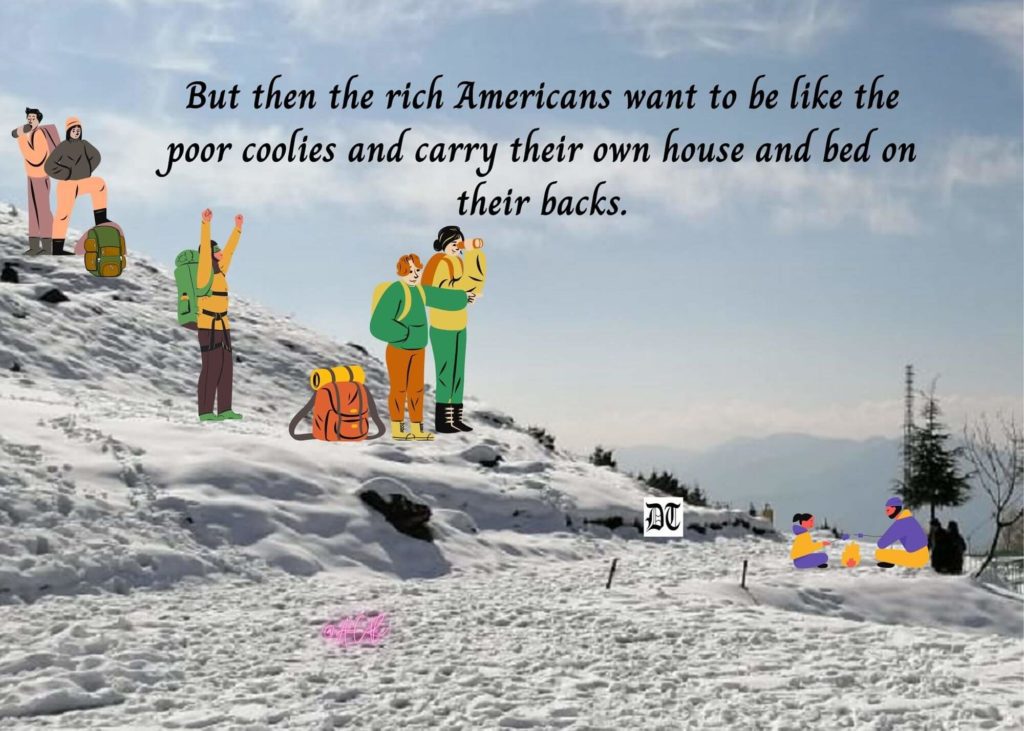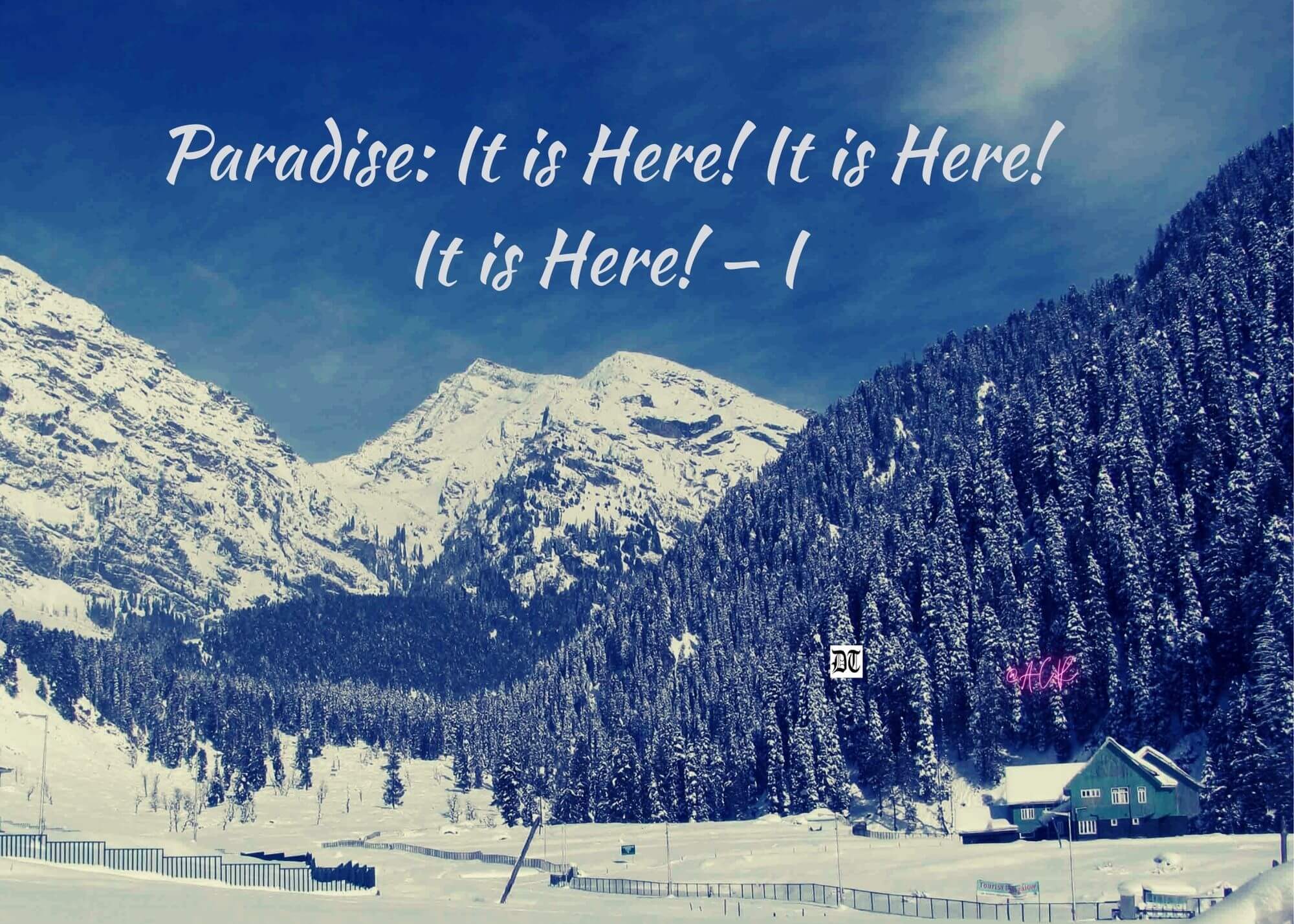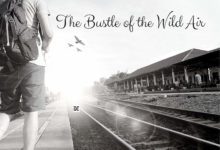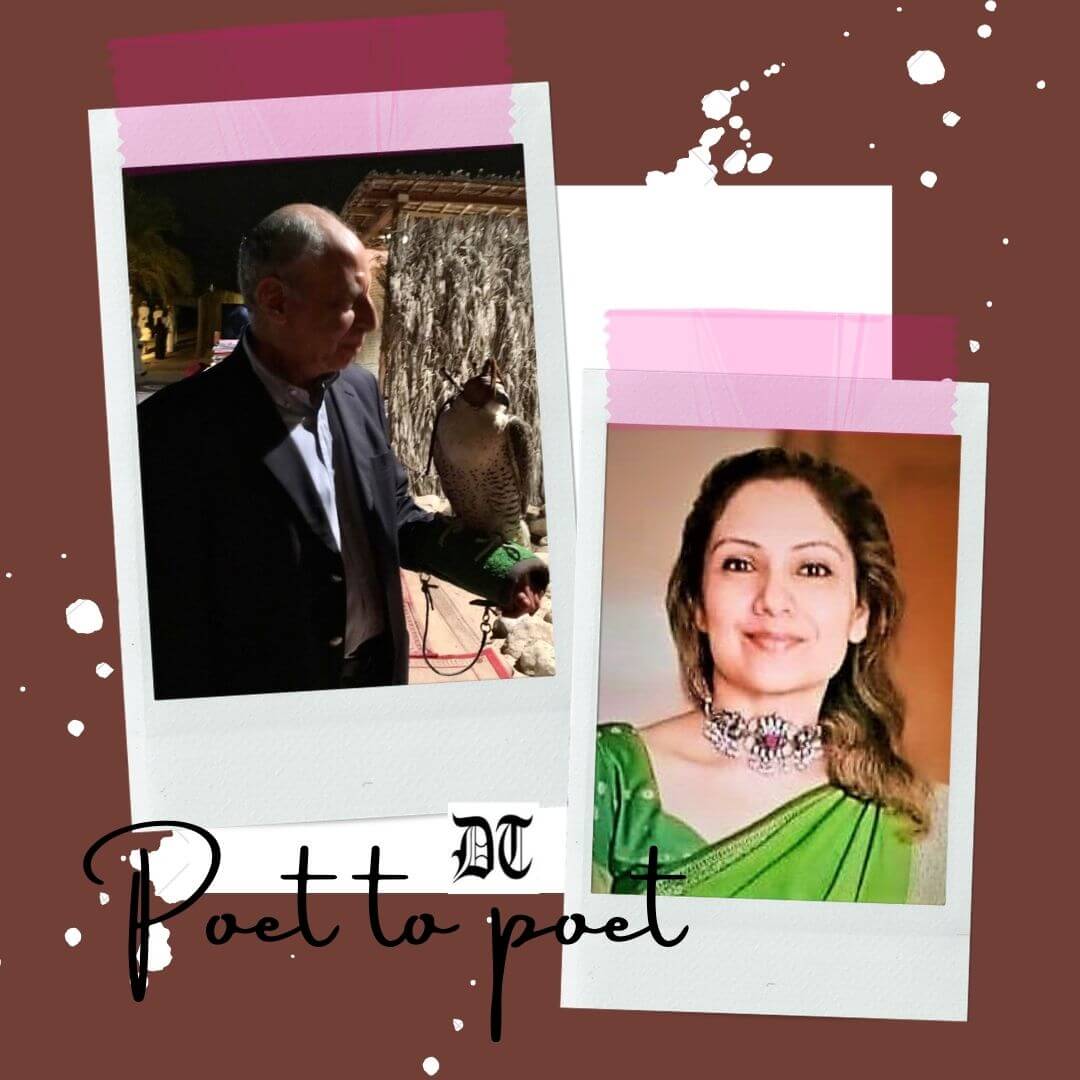Dr. Roopali’s trip to Paradise, Kashmir, weaves magic and mystery through memory. An exclusive for Different Truths.

All sorts of trunks and beddings and all kinds of people have slowed down the bus at the mouth of the tunnel through which we will go to Paradise. Winds colder than ice rush through the tunnel from the mountains on the other side, and slip inside our coats. And our bones now shiver and rattle.
There are buses in front, and buses at the back, but only a minute to buy cups of hot smoky green spice tea from the small wooden shops sloping down the hillside. The tea melts the ice on our tongues. Now, we can speak.
The heavy-with-boxes-and-people bus has slowly entered the tunnel, and after many years arrived into a green-coloured world. Everything is green. All the mountains are green with trees. And down below in the valley, there are lakes and rivers. “It is like dying and being born again!” One man wrapped in a big smelly blanket shouts. Everybody claps. My sister, Porridge, whispers, “He is just like Jesus!” “Jannat! Jannat!” Another man shouts. “Chup bewaqoof pagal ho gaya hai? Abhi zinda hai. Mar nahin gaye!” Everybody on the bus laughs.
I lick the sticky toffee off my fingers. It tastes bitter. The bus is rolling down its way down the mountain road…
I lick the sticky toffee off my fingers. It tastes bitter. The bus is rolling down its way down the mountain road, swinging this way and that through curling bends, rattling across hundreds and thousands of Christmas trees. “Just look at the lovely pines and chinars. This is truly the way to paradise.” Mother presses her hands together. As the bus stops suddenly dead at a crowded place full of honking buses.
“The Kingdom of God is not yet at hand,” Father laughs.
A Yellow Taxi
We board a yellow taxi with a very light-skinned driver with a long nose, who keeps calling us “Hindustani.” He wants to know if this is our first visit to Kashmir. He is driving us to a hotel called The Bombay Guest House. On the way, he keeps looking at Father and speaking through his long nose. “Yeh jannat hai. Jannat. Parradise sirrr.” As if we do not know. Although he talks a lot, he is not very friendly.
Porridge and I have found out that lunch in the hotel is always rice and “miksed daal”. This season few people have come to visit, the hotel manager explains to Father. Strange rumours are keeping the tourists away.
It is because of the “miksed daal”, we announce.
Just across the busy road, which goes somewhere, is Dal Lake. On it, Shikhara boats are sliding about calling out to people to come and ride. A shikhara man with a shikhara called ‘Peg of My Heart’ grabs us. “Come, come, I take you to see the Kaashmeeer.” His name is Taufik, and he is taking us to places we do not want to go.
First through hundreds of lotus leaves, which look like big plates. Fields of cabbages and cauliflowers float along. And boats filled with flowers and children move about like ghosts. After some time, The Peg of my Heart slips under 1 2 3 4 5 6 7 bridges.
“So this is the mighty Jhelum?” Father asks, and Taufik just paddles away through smelly waters, where poor boat people live in dirty houseboats. We have to stuff hankies into our noses to keep the stinky smell from sticking forever in our noses.
Smelly Waters
The crystal-clear clean river has turned into a smelly slow sludge carrying rotten fish, vegetables, and detergent. “My people have lost their freedom. The Kaashmeereee people of Paradise valley are very unhappy,” he moans to Father. “Why do others interfere with our peaceful lives?” he asks.
Father does not answer. I think he is afraid the smelly germs will get in if he answers all those questions. “He was talking all rubbish,” Father later explains. “Most of these characters are Fifth Columnists. The bloody fool deliberately took us through that filthy place!”
“Please don’t use language like this.” Mother begs.
Taufik, the Shikhara man, did not look like any of the names Father was calling him. He was not wearing a long black coat and a hat or dark glasses like spies.
Taufik, the Shikhara man, did not look like any of the names Father was calling him. He was not wearing a long black coat and a hat or dark glasses like spies. He looked so poor and unhappy. And he just seemed like he wanted to share his misery with us. He perhaps thought we were his friends. As he was only showing us what is happening to his Paradise Valley.
Porridge says his heart is leaking blood, and that is exactly why his boat has such a sad name – The Peg of My Heart! We drive up the road, which goes straight up to the cream-covered mountaintops. The road is lined with pine trees on both sides.
God’s Country
“This is God’s country,” Mother writes to her friend, Mrs. Leela Bose. “Peach and Cherry blossoms are slowly turning into fruit buds and the Chestnut is blooming in spiky balls inside which are delicious nut brown seeds. We have brought some back to roast on coal fires where the soft green spindly spikes will burn off and leave four smooth brown nuts to roast black. In some places, the snow has dribbled down the cone-shaped mountainside allowing people to ski down to the bottom.”

From America and other foreign places, people come here carrying their homes on their backs and set up tents to live in. Porridge says they are like Mahatma Gandhi because they want to live like the poor. That is why they leave their big houses, live in cloth huts, and carry their stuff on their own back just like coolies. The real coolies drink tea and wait for rich Americans to hire them to carry their stuff up the upside-down ice cream cone mountains. But then the rich Americans want to be like the poor coolies and carry their own house and bed on their backs.
This is how the poor coolies have become poorer. And the rich Americans have become poor. Soon they all go back to being rich again in their big houses…
They are true friends of Gandhiji. This is how the poor coolies have become poorer. And the rich Americans have become poor. Soon they all go back to being rich again in their big houses and the coolies have nowhere to go. They now follow the rich foreigners begging to hire them or do it free because they are their guests in Paradise Valley. But the true friends of Gandhiji rudely said no to them saying, “In our country we do our own work. We don’t beg like you filthy fellows.”
It did not surprise anybody when these people went up the mountain but never came down in their long funny shoes. Some have been found frozen dead with a coolie rope around their neck. Nobody felt sorry for them.
“Paradise Valley has everything and it is all ours.”
Flowery Air
Mother smiled proudly breathing the flowery air. “The purple coloured lakes, the fish jumping rivers, the meditating mountains with deep caves, home of ageing gods, the purple and gold saffron fields, the juice dripping apple, the syrupy peach coloured peach, the pulpy scented apricot, the tear drop lush pear, the blood red ruby studded cherries and the people whose faces reflect all this and the cotton candy sky. The crafty fingers of the people of Kashmir knit, knot, weave, carve, embroider, paint, and are part of our 5000-year-old heritage. We have to preserve it. Protect it.”
But sometimes when those fingers have nothing to knit, nothing to knot, nothing to weave, nothing to carve, nothing to embroider, and nothing to paint, they lift load and hang on to oars. But when that too is taken away, the crafty fingers wrap themselves around the cold muzzle of guns, which often mysteriously float down the river Jhelum in wooden boxes.
Those fingers, at first, fearfully, and then later, angrily, press their tips of creativity hard on the triggers. Boom!
That is when the snow falls off in powdery chunks from the mountains. And the mud buries houses and children. The newspapers call these snow slides and landslides. The foreigners, the newspapers say, were mauled by the Yeti. Big footprints in snow and ice have begun to appear. And the hairy Yeti has been seen lumbering off. Its blackness is lost in the snowy whiteness.
The icy blue origins of the Jhelum River, which goes across to the other side lies in the heart of the sage-like mountains.
The icy blue origins of the Jhelum River, which goes across to the other side lies in the heart of the sage-like mountains. Jehangir, a Mughal prince, had built a stone wall with arches to protect the river source from jealous eyes. It is called Chashma Verinag. He built it in 1620.
The royal spotted trout lives in its bottomless beginnings, surfacing suddenly only when visitors scatter wheat pellets. Then they rise like a sudden cloud and disappear just as quickly as they appear. Kings and Emperors built marble fountains where waters gushed like natural springs and flowers bloomed unasked, the bee sucked honey freely and Paradise was a possibility.
Today, Mother has returned from the bazaar with a stove, goat’s meat, rice, and Kashmiri masala – a flat red spice pounded paste. She has also bought a pot with a handle and a copper bottom. And a carved wooden spoon to cook curry in the hotel room. Porridge and I love secrets.
Porridge and I have been speaking only in whispers. We have walked many times since then to the old food-smelling dining hall of the hotel and asked the bored waiter who is always leaning weakly against the wall near a table which has ugly yellow patches of “What’s for lunch?” Without moving his arm, he answers in his boring voice, “Miksed daal.” Porridge and I look at each other giggle and giggle and giggle till our sides ache. The waiter only stares.
Mother’s Magic
Mother is a magician. Pieces of mountain goat meat in chilly red curry and snow-white rice served on lotus leaves and that too secretly! The steaming scent slips out of our room from under the door, across the landing, down the red damp smell staircase with its old wooden railings into the manager’s tiny room behind the reception desk at which Altaf Baksh sits waiting with a big register. Bunches of keys hang with Room numbers 210, 211, 212, etc., written on them. The hotel only has 80 rooms. The manager, round with a beard, and bald, steps out of his little room, looking surprised.
During the Monsoon rains, the River that THE ENEMY can’t cross over swells and spills over its banks.
During the Monsoon rains, the River that THE ENEMY can’t cross over swells and spills over its banks. The steel frame, which runs high above it from end to end now seems to fully stretch. When it rains forever the River becomes bigger than the bridge. That is only when it rains in the monsoons. Otherwise, the bridge stretches across the River.
In the summertime, Porridge and I walk across the bridge with Father and watch the tiny fisherman boats popping up and down.
The washerwomen swing their arms, beating clothes till they become black and blue, and the belly of the river is dry and shows up egg-shaped smooth stones with a crescent mark of God Shiva. People take them home and pray to them. Down in the crowded city around the famous cowboy Krishna temple, there is a bazaar full of noise called Raghunath bazaar. If you go there you can smell ripe smelly banana fruit carts, yellow marigold flowers, and dhoopbatti (incense stick) sellers. You can also stop at the book shops on the road pavements and buy picture stories of the Ramayana and The Mahabharata. Or even stories of Jeeves and Bertie Wooster.
(An excerpt from Dr. Roopali’s forthcoming novel, Porridge and I)
To be continued
Visuals by Different Truths






 By
By

